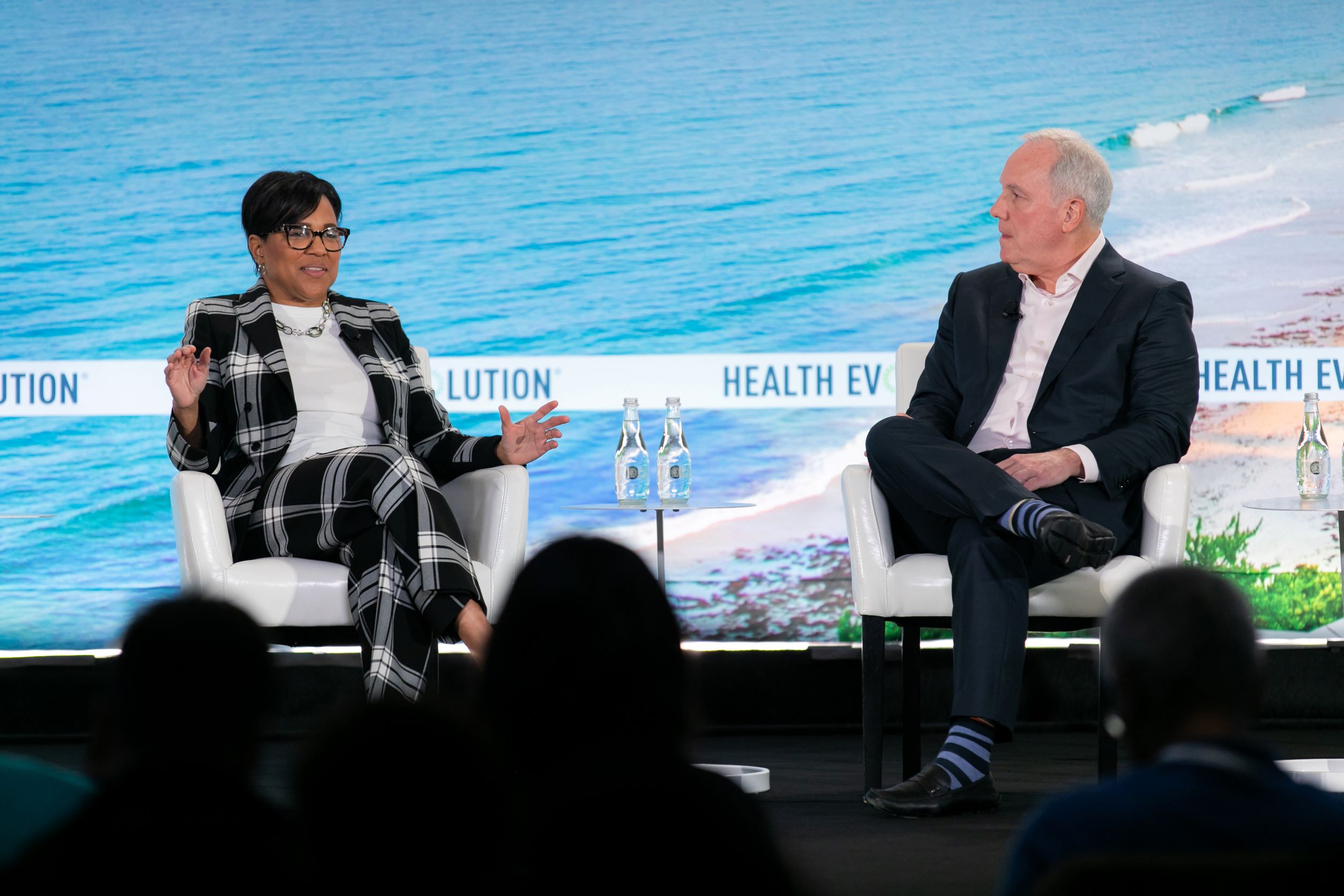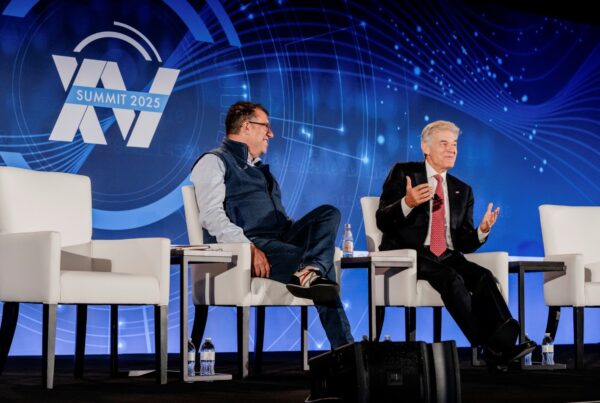While many health care executives look to the retail industry for cues about how to improve the consumer experience, Roz Brewer is in the unique position of having a career’s worth of deep experience in both industries.
Prior to joining Walgreens Boots Alliance as CEO in March of 2021, in fact, Brewer served in executive roles at Sam’s Club, Walmart, Starbucks and as a director on several boards including at Amazon.
During the 2022 Health Evolution Summit, Brewer engaged in a conversation with Health Evolution Executive Chairman David Brailer, MD, about her background, leadership, the future of primary care, and more.
Let’s start with your experience as an African-American woman in what has been a historically white male environment. How has racism affected you?
Brewer: Both racism and sexism have affected me undeniably, from my very beginning of entering into corporate America. I’ve probably seen the worst of leadership and I’ve seen the best of leadership and I’ve had to commandeer myself through all of that. One thing I will tell you is that it has built something in me about how intentional I am about my personal leadership. Having the opportunity to run very large organizations, I have been very focused on creating environments that are fair and equitable, creating environments where people feel like they can bring their whole self to work.
Read all of our 2022 Summit articles
Through the lens of your leadership perspective, are conditions improving? Is there more awareness or is it just more noise?
Brewer: I’m a bit of an optimist. I do think things are getting better. We all have had a shared experience going back to May of 2020 with the very visual murder of George Floyd and then going into a pandemic where we saw who was really impacted initially — and it was people of color. We’ve seen where health disparities meet climate change, meet racial injustice, all in the last 24 months. If we’re sitting in our seats and that didn’t affect any of us, then we’re likely in the wrong seat. I think this shared experience over the last 24 months should change us.
What advice would you give a CEO who calls you in an effort to understand how to lead through these tectonic changes in society?
Brewer: First of all, I get super excited, and I take every one of those calls because if you’re asking the question that’s self-awareness and I love that. Most of us have been courageous in terms of being transformative in the businesses that we’re in. We’ve been courageous in self-development, but now it’s time to be courageous about the environment we want to create for the future. That is only going to happen with great leadership. We can’t forget what leadership looks like in so many different venues. Showing up in communities where you’re unexpected, showing up to your teams when crisis happens and making sure that they know that you see them and you hear them and you acknowledge their presence and engage them in the conversation. We have to have the courage to make change happen.
One of the things I’ve observed as a board member of Walgreens Boots Alliance is the unique attention you give to culture compared to other CEOs. How do you think about that and where did it come from?
Brewer: When I think of culture, I believe that culture trumps strategy. You will absolutely run into walls when you put everything in financial terms and numbers because people are not motivated by a strategic plan. They want a good vision. They want alignment. But what they really want to know is how the environment makes them feel. So this piece around culture, it is about how you create a feeling amongst the team that you want to motivate the most. We’re spending a lot of time talking about that at WBA.
You spent a good part of your career at Walmart and Sam’s Club leading pharmacy and health care and on top of that you have sophisticated retail experience with Starbucks and on the board of Amazon. You probably are the most qualified CEO to answer: what is the essential lesson that health care needs to learn from retail?
Brewer: The real lesson is ensuring that when we are making these big decisions we put the consumer, the customer, the patient in the center of that. Retailers do that very well. They know that providing access to goods is their real mission in life. And if you just go back and look at retail 10 to 12 years ago and think about all the digital work that was going on to put the consumer in the middle and say, “we’re going to meet you where you are. We’re going to provide you access. We’re going to make it easier, simplify it.” You can think of the Amazons of the world, the Walmarts of the world. That’s essentially what they did through an omnichannel experience. They brought in probably four to five new channels and the world moved. I look at health care and there’s a lot of good happening out there, we have a lot of digital work happening in the industry and everyone is moving toward value-based care. But this is a time to think about how we bring access to the health care process for all of us. The way retail solved access of goods to people in a very simplified way is a challenge in front of us. We’re on a mission to see what our role can be to provide that access and to dedicate primary care physicians to communities that matter.
If there’s anything I’ve witnessed as a consumer it’s the explosion of how online retailers are able to understand everything I do in my shopping experience. Do you foresee that level of ability to understand what consumers are really after and to shape their health care experience coming in the future?
Brewer: I absolutely believe so. That should be the mission of all of us. When retail first embarked upon this, it was just attaching your credit card data to your visits in the store. That was the simplest part of it. The opportunity to take the information we have on our customers, in our stores, along with their prescription history, along with what’s happening in our VillageMD centers and in our health corners and bring that together and put it in the hands of the caretaker and the patient in a handheld device is what we all need. That’s exactly what retail has done. I’m always amazed when I get that text message in the morning about the next item I need for my household, because someone’s monitoring that. Imagine the day when a diabetic who is not adhering receives a reminder about what to do next. We can get there.
What do you see as being the primary barrier we have to overcome to bring that to health care?
Brewer: It’s the personalization of it all. I would always say in my retail days that the real winner is the one who owns the middle between the human connection and the digital, because it’s not one or the other, it’s both.
You wasted no time coming into WBA and investing in VillageMD. How do you envision that playing out over time?
Brewer: We envision that playing a very strong role in the continuum of care for patients. In short order, 50 percent of our 9,100 units across the United States will have some touchpoint of health care. We’re going to be placing at least 1,000 VillageMD units to create a primary care physician experience in our stores. We also invested in Shields, which is a specialty care pharmacy unit. And then think of the CareCentrix relationship we have, which is post-acute care. Then there are the pharmacist relationships we already have with our customer base. When you combine those and then put the customer or patient in the middle, we have a unique opportunity to be that physical destination and bring them care in a very personal way.











